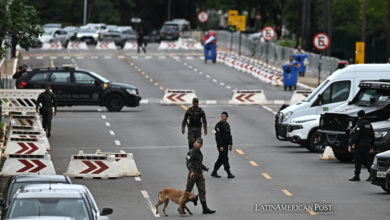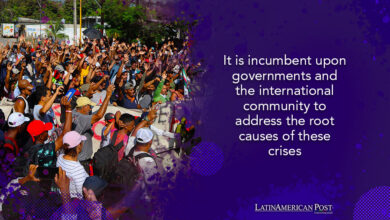Rejecting Weak Diplomacy: Countries must Stand Firm with Guyana Against Venezuela’s Aggression
The Mercosur bloc's call for a peaceful resolution in the Esequibo dispute displays weak diplomacy, overshadowed by leftist ideology. It's time to firmly reject Venezuela's actions and fully support Guyana in this territorial conflict.

Photo: LatinAmerican Post
The Latin American Post Staff
Escucha este artículo
Leer en español: Rechazo de una diplomacia débil: los países deben mantenerse firmes con Guyana frente a la agresión de Venezuela
Unfolding Geopolitical Drama in Esequibo Region
In the unfolding geopolitical drama of the Esequibo region, the recent call by South American countries, including the Mercosur trade bloc, for a peaceful solution between Venezuela and Guyana is a classic example of weak diplomacy steeped in a passive, leftist ideology. It's a stance that not only undermines the severity of the situation but also emboldens the aggressive postures of authoritarian regimes like that of Nicolás Maduro's Venezuela. In such a scenario, complete and unwavering support for Guyana is a strategic necessity and a moral imperative.
The Mercosur bloc, comprising Argentina, Brazil, Paraguay, Uruguay, and non-Mercosur members Chile, Colombia, Ecuador, and Peru, issued a joint statement expressing concern over the escalating tensions between Venezuela and Guyana. They urged both nations to engage in dialogue and avoid unilateral actions. However, this diplomatic rhetoric falls short of recognizing the root cause of the problem — Venezuela's aggressive and unjustified claims on the Esequibo region.
Venezuela's actions, guided by Maduro's leftist regime, are nothing short of imperialistic. By laying claim to the Esequibo region, a territory long recognized as part of Guyana, Maduro is not only flouting international norms but is also threatening the sovereignty of a peaceful neighboring nation. This move is a clear display of Venezuela's disdain for international law and its neighbors' territorial integrity. In this context, calls for peaceful dialogue, while noble in sentiment, appear naïve and ineffective.
Appeasement Not the Answer
The response to aggression cannot be appeasement. History has taught us time and again that aggressors view diplomacy and calls for peace as signs of weakness, emboldening them to further their territorial ambitions. Therefore, the stance taken by the Mercosur bloc and other South American nations risks being interpreted by Maduro's regime as a lack of resolve to confront his expansionist policies.
Supporting Guyana in this dispute is not merely about taking a stand against Venezuela's unjust claims; it's about upholding the principles of international law and national sovereignty. Guyana, a small nation, has shown remarkable restraint and commitment to legal processes by taking its case to the International Court of Justice (ICJ). However, Venezuela's outright rejection of the ICJ's jurisdiction and its continued provocations highlight the futility of expecting a peaceful resolution through dialogue alone.
Maduro's Regime: A Barrier to Diplomacy
The argument for solid support of Guyana is further bolstered by the nature of Maduro's regime in Venezuela. A government that has consistently undermined democracy oppressed its people, and led its country into economic ruin cannot be expected to engage in good-faith negotiations over a territorial dispute. Maduro's actions are driven by a desire to divert attention from domestic failures and rally nationalist sentiment — a tactic often employed by authoritarian leaders.
The call for peaceful resolution is also influenced by a broader trend of leftist ideology within the region, which often prioritizes diplomatic overtures over decisive actions. While diplomacy is a valuable tool in international relations, its effectiveness is contingent on the willingness of all parties to engage honestly and respectfully. In the case of Venezuela, we are dealing with a regime that has repeatedly shown its disregard for such principles.
Also read:Venezuela Issues Warrants in Opposition Campaign Controversy
In contrast, supporting Guyana sends a solid message to authoritarian regimes in the region, and beyond that, territorial aggression will not be tolerated. It reinforces the importance of international law and the right of nations, big or small, to live in peace without the threat of territorial encroachment.
Guyana's Strategic Importance
Moreover, Guyana's strategic importance in the region must be considered, especially regarding its natural resources and potential role in regional stability. Ensuring Guyana's territorial integrity is crucial not only for the country itself but also for the stability and security of the South American continent.
In conclusion, the Mercosur bloc's call for a peaceful solution, while commendable in its intent, is an inadequate response to the gravity of the situation. It is a reflection of a misguided leftist ideology that underestimates the dangers posed by aggressive, authoritarian regimes. The need of the hour is not just dialogue but decisive action and unwavering support for Guyana. Only then can we deter future acts of aggression and preserve the sanctity of international law and order. The world must stand in solidarity with Guyana and send a clear message to Venezuela: territorial aggression has no place in modern international relations.




